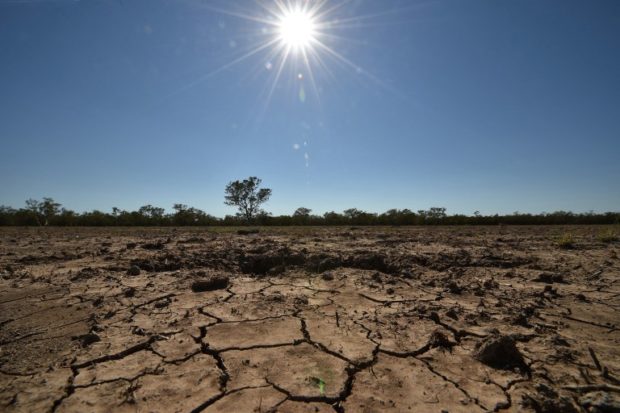Climate talks resume online as pressure to act grows

FILE PHOTO: This file photo taken on February 11, 2015, shows the sun scorching the already cracked earth on a farm in the Australian agricultural town of Walgett, 650 kilometers (404 miles) northwest of Sydney. Soaring temperatures driven by climate change are whipping up ever-more intense storms inundating cities with flash floods but leaving the countryside and crucial agricultural land parched, an Australian study has found. / AFP PHOTO / Peter PARKS
PARIS — For the first time since 2019 and following a flurry of net-zero pledges from the world’s largest emitters, UN climate negotiations resumed Monday in a virtual format less than six months before the crunch COP26 summit.
The talks, nominally hosted by the United Nations climate change program in the German city of Bonn, will all be informal, meaning that no decisions will be taken during the three-week discussions.
But with increasingly dire warnings from scientists that the pace of global warming is already outstripping humanity’s best plan to cut emissions, the pressure for progress to be made on a number of thorny issues is high.
In 2018, countries agreed to many elements of the “rulebook” of the landmark Paris climate agreement signed three years earlier, governing how each nation implements its goals under the deal.
But several issues remain unresolved, including rules about transparency, carbon markets, and a unified timeframe for all countries to ratchet up their emissions cuts.
Article continues after this advertisementAt the last UN climate summit in December 2019, countries also failed to agree upon a universal system of reporting on spending on measures to combat and adapt to climate change.
Article continues after this advertisementNathan Cogswell, a research associate at the World Resources Institute, said a deal on greater transparency was “a central component of the effective implementation of the Paris agreement”.
“The upcoming session will hopefully help parties get closer to that,” he said.
One of the thorniest debates during recent UN climate talks has been Article 6 of the Paris agreement, which deals with the trade of emissions cuts.
A major sticking point remains over rules to avoid double-counting emissions reductions within both bilateral and international carbon markets.
Some wealthy nations without the natural resources — forests, for instance — to mitigate their contribution to climate change have spent huge amounts on projects to preserve those habitats in other countries.
Currently, both the buying and selling nations may count the project towards their domestic climate action, opening the door for the same cut to be counted twice.
Teresa Anderson, climate policy coordinator for ActionAid International, said it was vital that negotiations don’t “crank open loopholes that let big polluters carry on business-as-usual”.
She said that the entire UN climate process was overly reliant on emissions offsets, including carbon cut trades.
“They make it all too easy for polluters to hide the fact that they are not making the real emission cuts that the planet urgently needs,” Anderson said.
‘Not ideal’
COVID-19 forced Britain and the UN to shelve talks originally scheduled for last year in the Scottish city of Glasgow until the end of 2021.
As the pandemic continues to rage, particularly among developing nations most vulnerable to the impacts of climate change, negotiators will need to achieve tangible progress during the three-week Bonn talks.
“The absence of a COP left a tremendous amount of work to be done… if we want to deliver at Glasgow,” said Marianne Karlsen, chair of a major technical forum at the UN-led negotiations.
The two-week sessions — expanded this year to three — normally involve thousands of representatives from more than 180 countries, and often rely on behind-closed-doors bargaining between delegates to get deals done.
Karlsen said the virtual configuration of talks was “not ideal at all”.
“We really wanted to be able to have all the interactions of when we meet in person but there was no other option,” she said.
Tosi Mpanu Mpanu, chair of the UN’s SBSTA technical working group, said delegates needed to use the virtual negotiations to move forward, “so we can capture that progress when we meet in person, and make decisions” in Glasgow.
“It’s important that we send a clear message to the world: We are very much engaged in resolving the Paris rulebook and to tackling this climate change conundrum.”